"…the greatest thing Rintu Thomas and Sushmit Ghosh’s Writing With Fire does is that it makes visible this silent work behind the much-chastised word – ‘empowerment’. May this documentary, which follows three KL journalists through a critical phase of Khabar Lahariya’s evolution, be watched far and wide, and may it continue to do what great documentaries are made to do: bear witness to truths that help us see, for the first time."
“WRITING WITH FIRE”: 20 YEARS OF WORK BY MINORITY WOMEN
- Board Member, Khabar Lahariya, February 2022
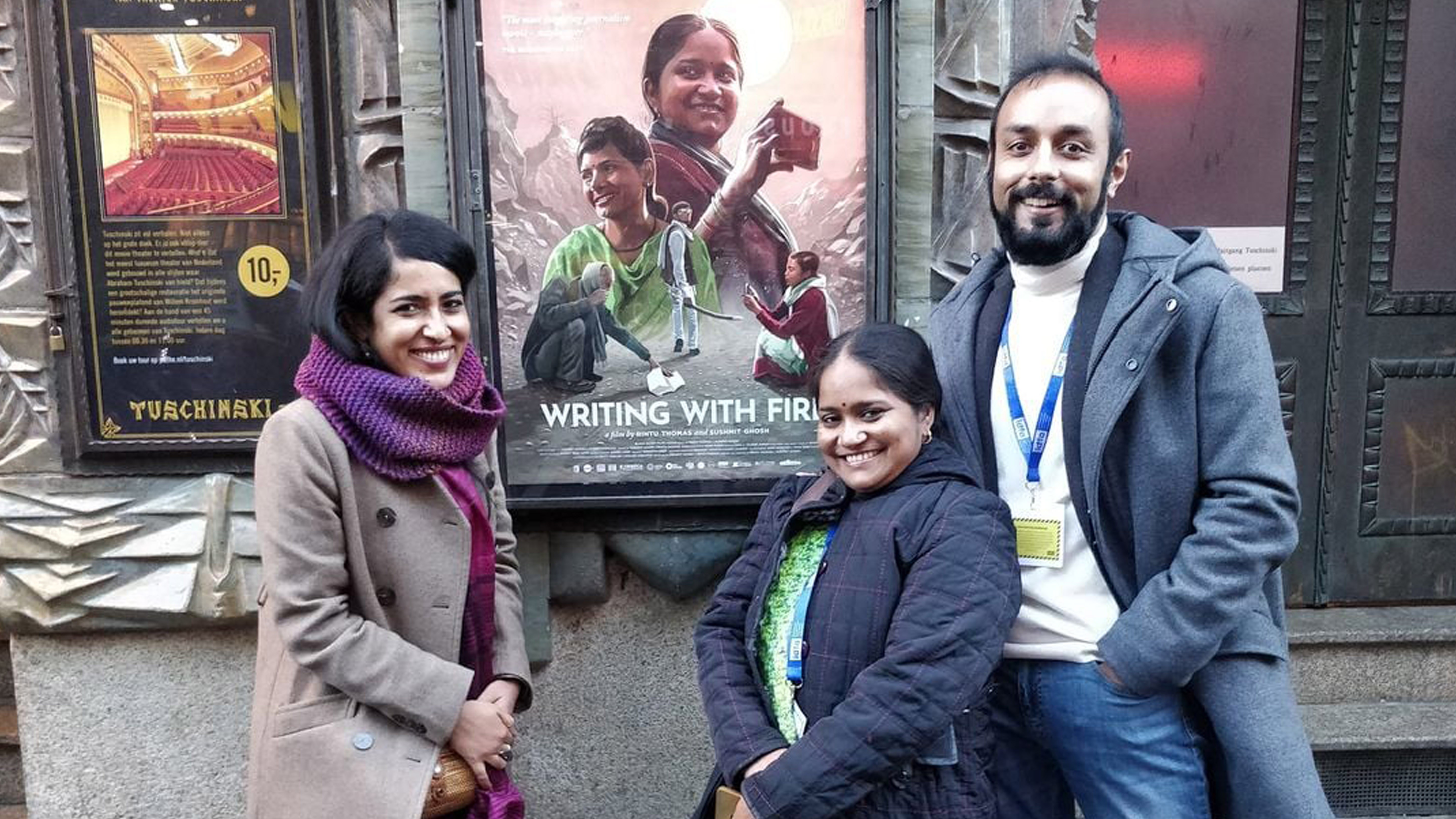
The impact campaign on Writing With Fire began in parallel to the film’s five-year making and continued during its distribution, spilling over to its afterlife. The filmmakers and Khabar Lahariya leadership set goals that shaped the core strategy:
THE TRIFECTA OF CORE IMPACT STRATEGY
1. Raising funds and resources for the news organization.
2. Curating strategic institutional partnerships and alliances for strengthening the news organisation’s work.
3. Profiling and amplifying the news organization in international media.
THE BEGINNING
During the very first pitch of Writing With Fire at Docedge Kolkata (a pitching forum for South Asian documentaries) in early 2016, the film’s pitch attracted immediate, tangible support of resources for Khabar Lahariya. For both the filmmakers and the participants, this was an important moment in understanding that this story has the power to galvanise support for Khabar Lahariya with tangible resources.
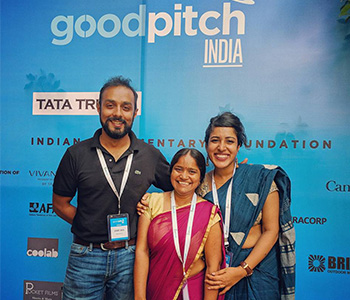
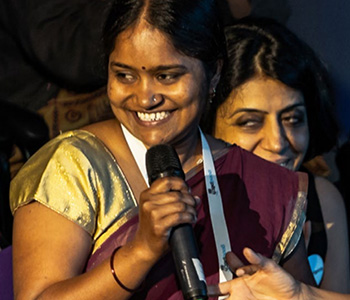
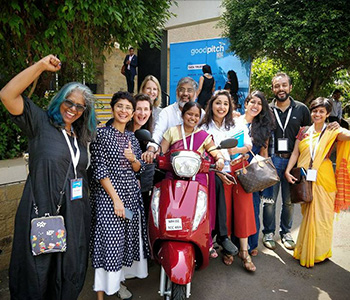
2016-2019
Through the course of the film’s production, the producers along with the Khabar Lahariya leadership co-crafted a specific strategy to raise critical support for the organisation.
At GoodPitch India in 2018, while the film was still in production, the filmmakers invited the film’s protagonist Meera Devi and her colleague Disha Mullick from Khabar Lahariya to share the space and pitch alongside. The opportunity of being at GoodPitch was strategically designed to leverage the platform to start building the first set of connections, partnerships and resources pool for the news entity. At this single pitching forum itself, a rousing momentum was built.
- Funds raised through a live crowdfunding campaign kickstarted on the pitch day.
- Mobile phones committed on the spot.
- A two-wheeler was gifted to Meera to ease her commuting for doing her stories in far flung villages with poor public transport connectivity.
- Offer for Alfred Friendly Press Fellowship at the Missouri School of Journalism for Meera.
- IPI offered to have Press Cards/ accreditation to all journalists in the news organization.
- Nomination for the prestigious IWMF award (actualised in 2021 with the film’s release).
THE FILM’S RELEASE
In 2021, the year of the film's release, the impact strategy was amplified as the film met its first audiences across the globe. The first part of this was to bring Hindi-speaking journalists from Khabar Lahariya to international facing events and build a community around them. Before the world premiere at the Sundance Film Festival (Jan 2021), the film was screened in Uttar Pradesh for all the protagonists, an emotional moment of joy, tears and applause shared by everyone involved behind and the in front of the camera. Kavita Devi, the co-founder of Khabar Lahariya, responding to the film and its significance for the institution says:
“I am very proud that this film has chronicled Khabar Lahariya’s story…what makes me really happy is that our story has been recorded. Tomorrow — if we are not around, this film will stay to inspire generations to come.”
Khabar Lahariya co-founder Kavita Bundelkhandi, after watching Writing With Fire (January 2021).
A week later, Meera Devi (the protagonist of the film and the Managing Editor at Khabar Lahariya), joined the filmmakers virtually for the film's world premiere and the official virtual Q/A to talk about the film and its significance on the organization’s work.
After Sundance (January 2021) the filmmakers curated opportunities to have the participants co-represent the film at several conversations, panel discussions and forums, speaking on authorship, representation and the ethics of storytelling.
- March '21 / Columbia Journalism School (Sushmit, Rintu and Meera Devi) / USA: Session with journalism students about ‘the process of making Writing With Fire’ and the intersectionality of filmmaking and journalism, led by Prof June Cross, Director, Documentary Journalism Program, Columbia Journalism School
- April '21 / Doha Debates + Camden International Film Festival: Solutions Cinema Summit (Sushmit, Rintu and Meera Devi) / USA: Session titled : "The Ground Truth' - where the discussion is on what happens when those on the margins of society use storytelling to speak truth to power? Link to conversation.
- April '21 / CPH Documentary Film Festival (Sushmit, Rintu and Suneeta Prajapati) / Denmark: Panelists at a conference titled REPRESENTATION:POWER. In this session, the directors of CPH:DOX-featured films come together with participants to share key challenges and lessons learned, explore the themes of representation and justice, while reflecting on what it means to create social and political impact through documentary filmmaking.
- April' 21 / CPH Documentary Film Festival (Sushmit, Rintu and Meera Devi) / Denmark: Panelists on a session titled “The unbeatable female journalists of India”. Link to conversation.
- April '21 / Cleveland International Film Festival (Sushmit, Rintu, Meera Devi & Shyamkali Devi) / USA: Post screening Q/A of Writing With Fire with Patrick Shepherd, Associate Director of the Festival. Link to conversation.
- November '21 / International Film Festival of Amsterdam (Sushmit, Rintu, Meera Devi) / The Netherlands: In-person post screening Q/A of Writing With Fire with Sarah Dawson, Senior Programmer, IDFA at the Tuschinski Theatre.
- February '21 / The New York Times Opinion piece: Pulitzer prize-winning journalist Farah Stockman interviews Rintu, Sushmit, Kavita Bundelkhandi and Meera Devi about Writing With Fire and KL's journalism for an opinion piece titled, What an All-Women News Network in India Shows Us About Democracy.



FILM PARTICIPANTS MEERA, SHYAMKALI AND SUNEETA PARTCIPATE IN DIFFERENT VIRTUAL PANELS WITH FILMMAKERS
"I don’t know where to start. I don’t know how this film gave birth to a friendship. Many people have made short films on Khabar Lahariya. We’ve been documented a lot. But there’s nothing like Writing With Fire. It’s extremely unique. I don’t how we built this trust during the film, it just happened…We just naturally formed a beautiful friendship and trusted each other. Did I get to see the film once it was completed? Yes, we all saw the film, especially the three main characters. We’ve all seen it."
- Meera Devi, Managing Editor at Khabar Lahariya.
WATCH FULL VIDEO"I think this film will create a lasting impact. People will get to know about Khabar Lahariya and the type of journalism we do….It will also shed light on being courageous as a journalist. Just like how I look up to so many inspiring figures, this film might help someone find their role model."
- Meera Devi, Managing Editor at Khabar Lahariya.
WATCH FULL VIDEO"And as time went by, I didn’t anticipate the film to have such a huge response. I’m extremely happy and proud to be part of this film."
- Meera Devi, Managing Editor at Khabar Lahariya.
WATCH FULL VIDEOAt the Human Rights Film Festival of Berlin (Oct, 2021), in the backdrop of the Writing With Fire’s screening, the filmmakers suggested to the Festival Director that the festival conference be curated between their team in Berlin with the Khabar Lahariya team in Uttar Pradesh. A unique partnership was envisioned and Khabar Lahariya was invited not just as panellists but as partners on a commissioned opportunity as co-producers of the 3-day conference on 'The Power of Storytelling'.
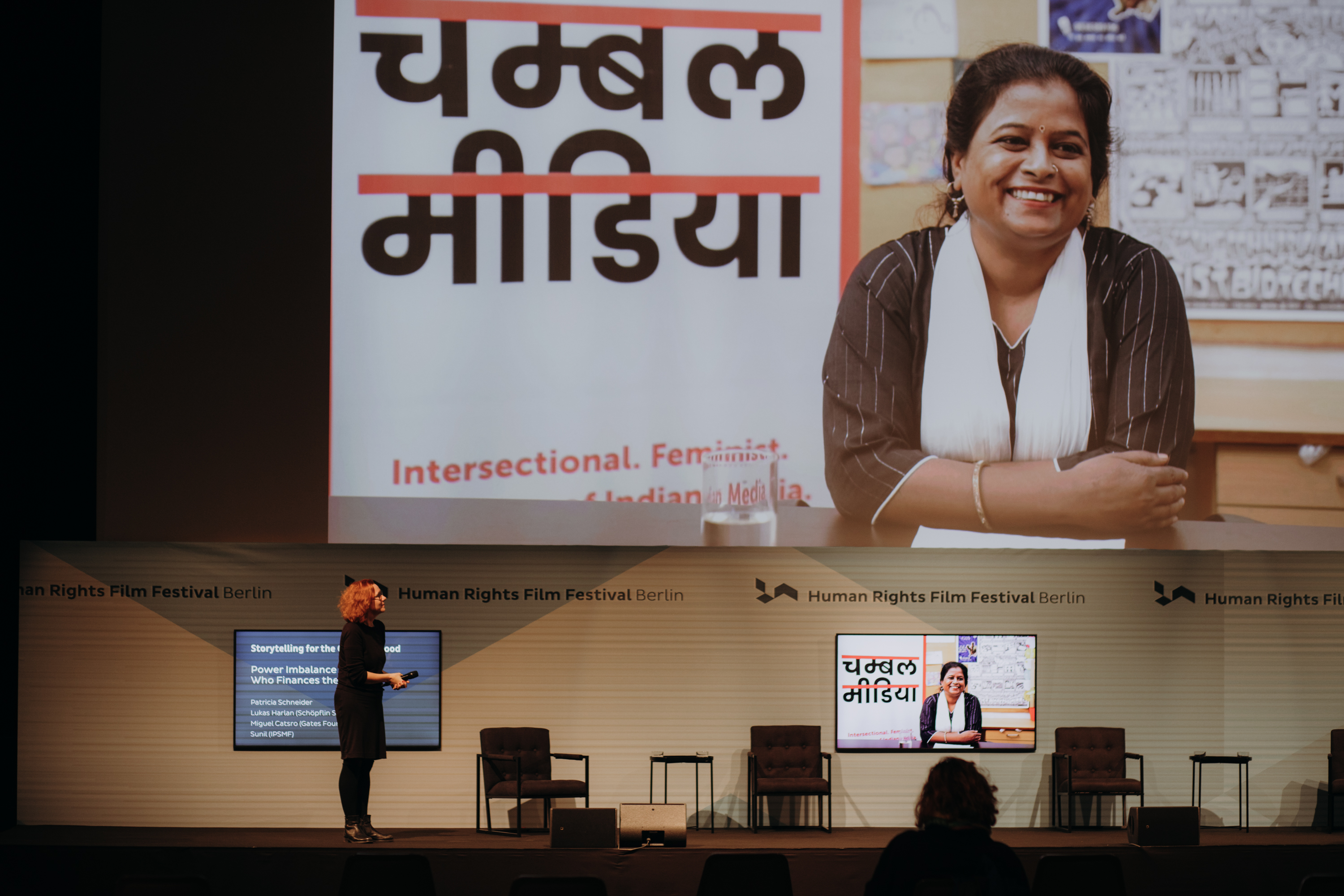
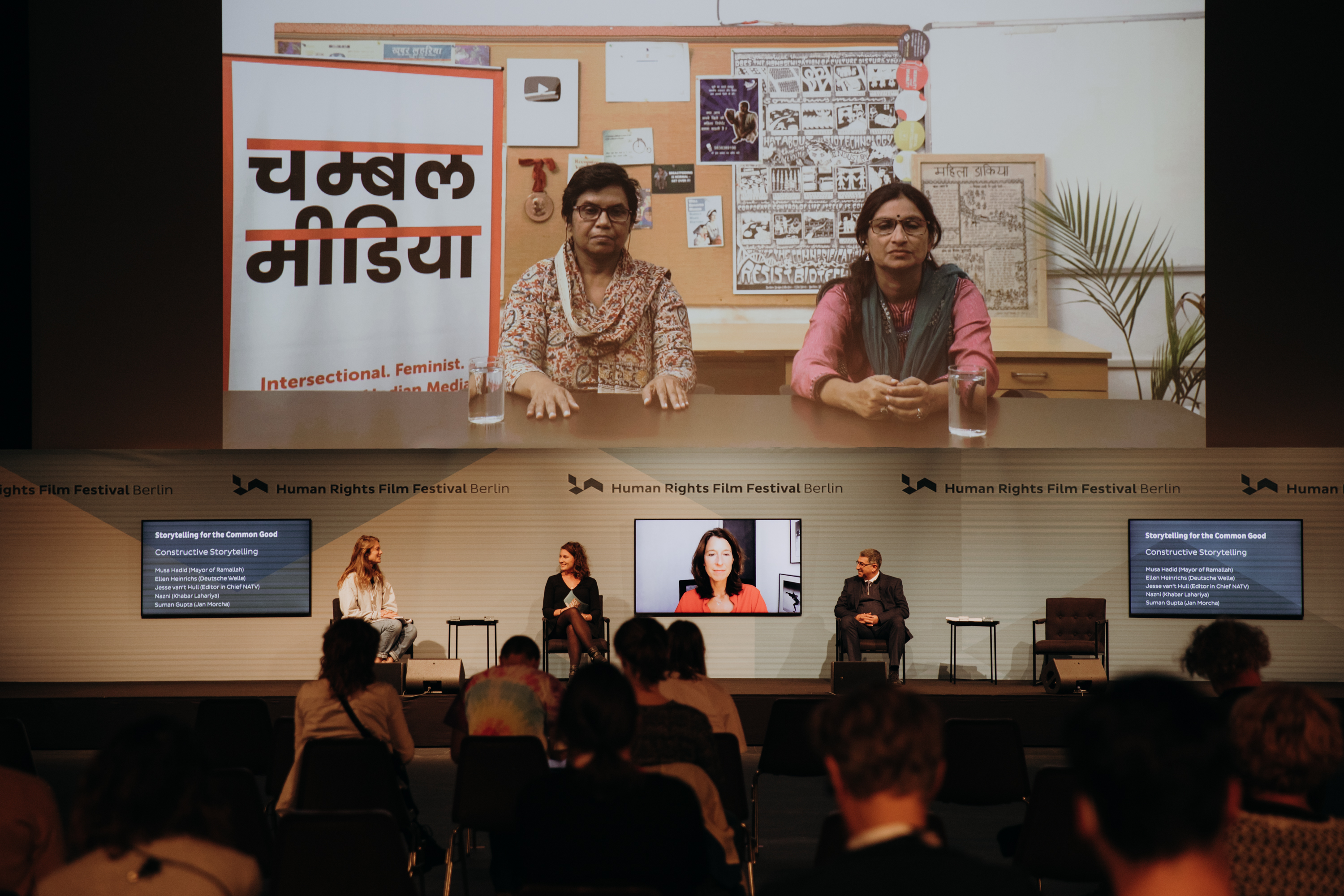
Human Rights Film Festival of Berlin (Oct, 2021)
As Writing With Fire was traveling to film festivals across the world, the filmmakers strategically leveraged press opportunities to involve the Khabar Lahariya reporters, which led to some fantastic media amplification of their work. The filmmakers were able to activate the nomination commitment made in Goodpitch India for the prestigious IWMF Courage in Journalism Award, which Khabar Lahariya went on to win and received the award from Christian Amanpour. When Meera Devi, the lead protagonist of Writing With Fire attended IDFA with the filmmakers, the response was stupendous, sonorous and sublime.
This moment at IDFA, where the film won an Audience Award, captures the power of the film and their work.
Since its premiere at Sundance, Writing With Fire has played in over 200 festivals across the world, garnering over 40 awards and rich critics reviews. Writing With Fire went on to become the first Indian feature documentary to be nominated for an Academy Award. In 2023, the film won the Peabody Award, becoming the first Indian documentary in the award's illustrious 80-year history to pick up this honour. In an interview with Documentary Magazine, where Meera Devi was commissioned to interview the filmmakers (in an interesting reversal of roles), she candidly talks about why she allowed the filmmakers (who do not share her caste and class locations) into her world. Meera says:
"Many people have wondered how we—as Dalit women journalists living in Bundelkhand—collaborated with the Writing With Fire team from Delhi. I don't blame people for being wary. We have been given these preconceived ideas about ourselves and our castes that we keep bearing as a burden. We have to break out of that. When I wanted to study as a child, my father said I couldn't study beyond the fifth grade. Even then, I knew that my father—the person—did not want my education to stop, but my father—the man who is answerable to the society and is a part of it—had to stop me from studying because that was what was expected of him. That was the culture. We have to change that, and we can change that when we interact and collaborate with other people like Rintu, Sushmit and Karan [Thapliyal, the film’s cinematographer along with Ghosh]. People in Bundelkhand, as in the rest of the world, have very strong religious prejudices. So to see Rintu and Sushmit, each belonging to a different religion, work together and create art together was an inspiration to me. You don’t see that where I live. I was attracted to that way of working and wanted to learn how they did it. It gave me a living example of what happens when people believe in change."
- Meera Devi, Managing Editor at Khabar Lahariya.
READ ARTICLEIn the same month, speaking to a journalist of Business Doc Europe, Meera spoke about the impact of Writing With Fire on her and her organization:
“From a global perspective, we have become a lot more popular since the film came out [in Sundance]. Both personally and professionally, it has really amplified the newspaper and its work. We have witnessed a completely different kind of popularity – and that is really good”
- Meera Devi, Managing Editor at Khabar Lahariya.
READ ARTICLE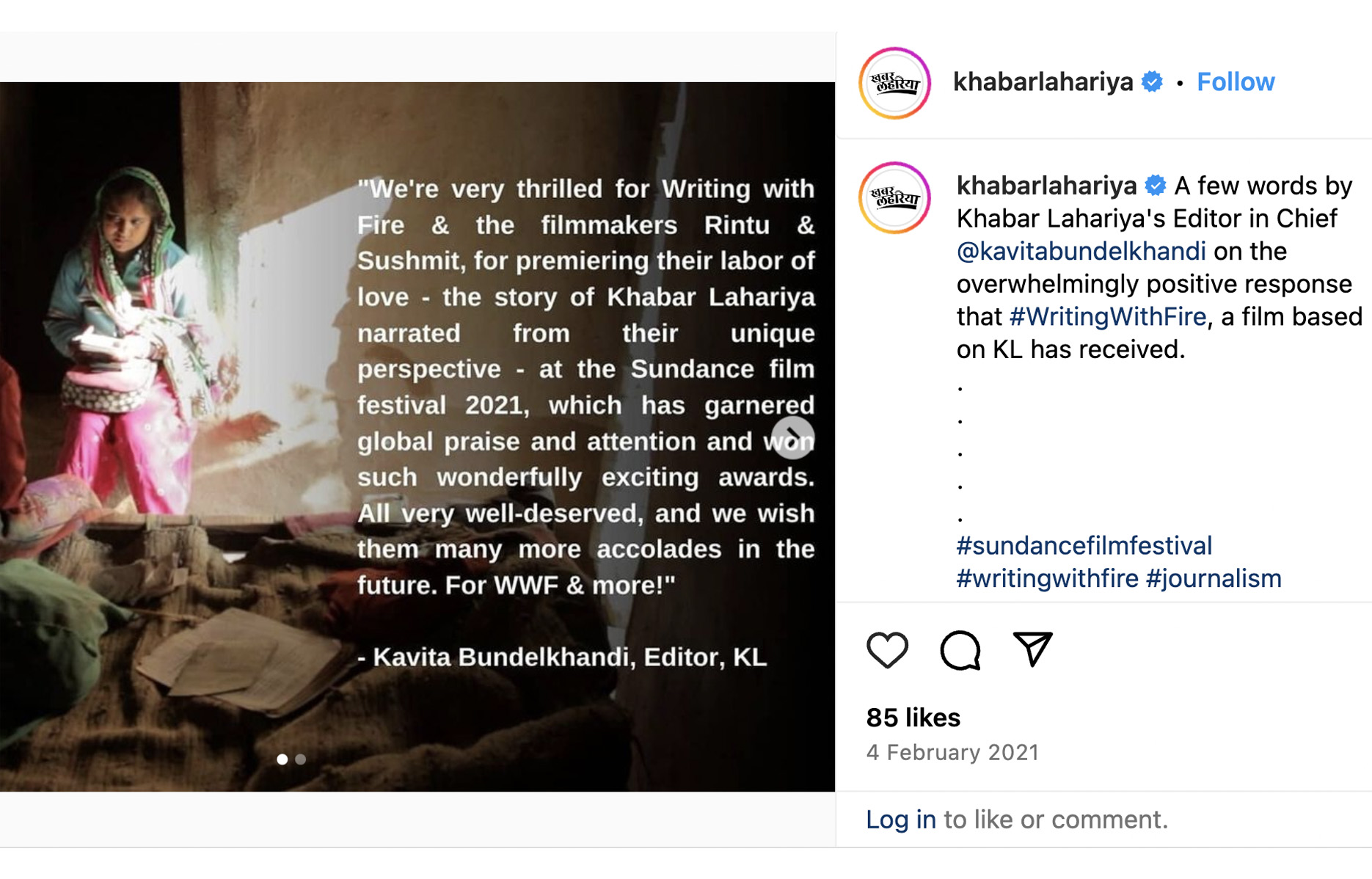
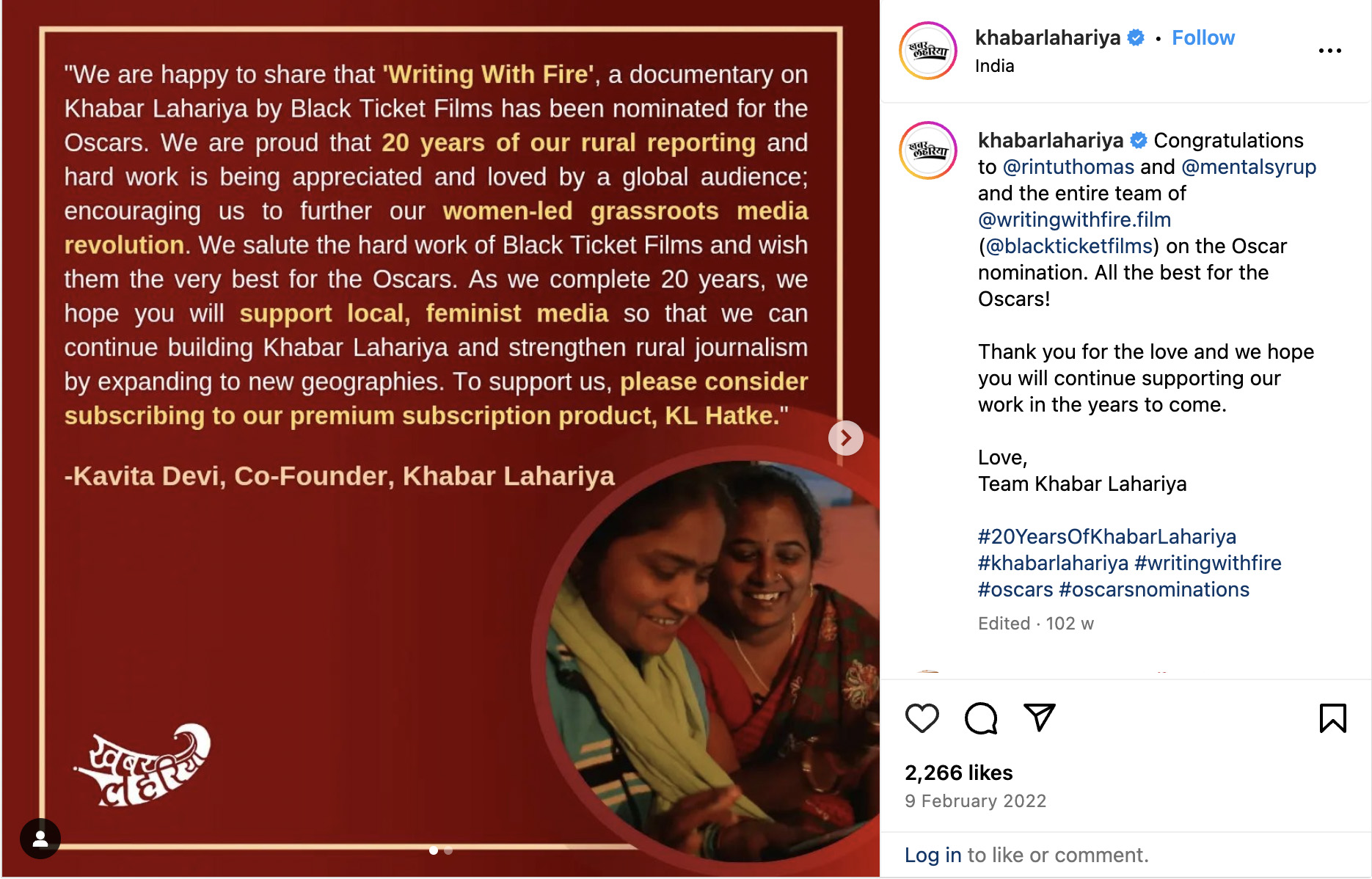
During the Academy run of the film, the filmmaking team worked with multiple international institutions and partners to further deepen the impact campaign, with a focus on amplifying the work of the news institution. This resulted in specifically curated screenings with global newsrooms, international Dalit solidarity and anti-caste groups to widely watched shows like the Amanpour Show and strategic high level impact screenings for journalists at the DC Press Club in Washington and the TIME magazine’s newsroom.
THE INDIA JOURNEY
In October 2022, Writing With Fire came home to premiere at the Dharamshala International Film Festival. A nearly 10-min standing ovation at the end of the film from an audience, followed by a thoughtful and engaging post-screening conversation that focused on questions around the film but also about the price that truth seekers have to pay in a complex and fractured democracy. This premiere built great momentum for the pan-India screenings of the film.
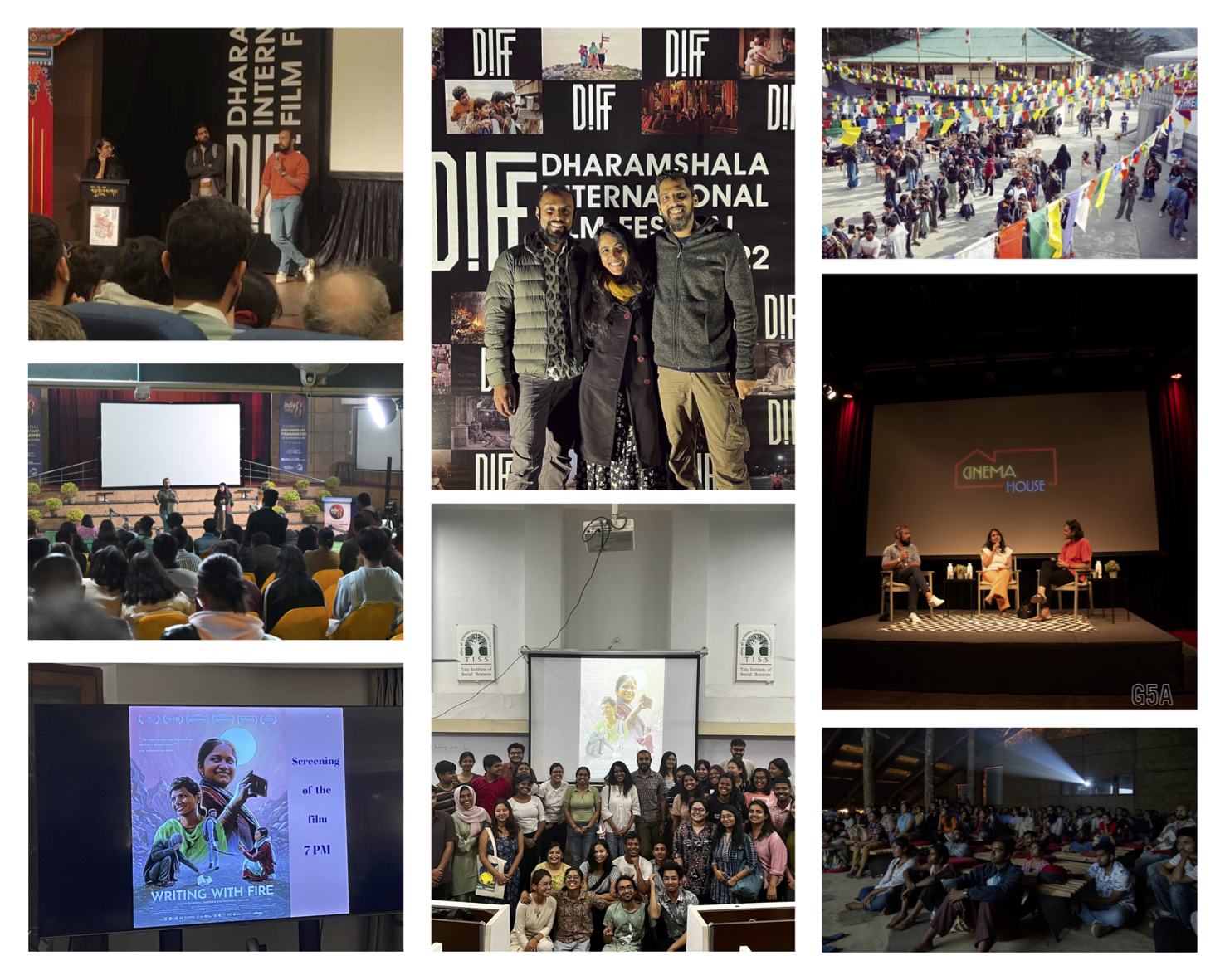
Writing With Fire has had over 100 screenings all across India. Apart from a general audience, each of these screenings is specifically aimed at five critical groups - journalists and newsrooms, Universities and Journalism schools, Dalit-rights activists and Ambedkarite groups, media students and gender rights organisations. These screenings have led to robust dialogues on democracy, authorship, the value of a free press and how to actively support the work of independent journalists across the country. With no distribution or streamer offers for India, this film's journey follows the Indian tradition of watching and sharing non-fiction cinema through strategic partnerships with civil society groups, Universities and classrooms as well as regional film festivals and spaces curated by a cine-watching audience.
To be able to create this film, at this moment in nation's history, has been extremely meaningful for the entire team behind Writing With Fire – as the film continues to find new homes and spark important conversations, tapping into our hopes that the stories we tell will continue to find resonance and relevance beyond their festival lives.
An independently produced Indian documentary, with no mainstream studio, streamer or distributor backing it, making its way to an Academy nomination has also opened the doors of imagination of filmmakers across South Asia - of how far an independently produced film can travel. The filmmakers count this milestone also as an (unscripted) long-lasting impact of the film.



